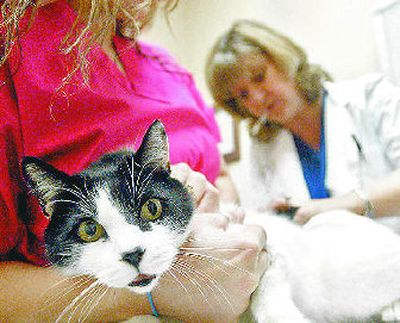Study options if you want to be vet

A lot of people want to be a veterinarian at some point during their childhood. Most of them get over it. I did.
By the time I was 12 years old, I had decided, instead, to be a professional cellist as a cover for actually being an international spy. I returned to the idea of becoming a veterinarian during college. (A lack of musical talent was not the only reason.)
Most kids think of becoming a vet because they love animals, and find them beautiful and interesting. However, there are many other important things to consider.
I sometimes hear students say they want to go to vet school instead of medical school because they like animals, not people. Well, don’t forget, animals don’t walk into vet clinics by themselves and announce that they’re sick. They come with people who are concerned, have questions, and want help in getting their animal better.
Even veterinarians engaged in research have colleagues to work with as well as teaching responsibilities. In fact, helping people learn how to care for their pet or helping them through difficult situations with their animals is just as gratifying as helping the animal itself.
Children who have a desire to help animals don’t have to wait until they are older to start investigating veterinary medicine. Junior high and high school students can look into volunteering at a vet hospital, animal shelter, stable or boarding facility. Working with animals through 4-H is also good experience. In fact, virtually every veterinary school will require students to have a certain number of hours working with animals or in vet hospitals because they want to make sure the students understand both the positive and negative aspects of the profession.
If you are interested in becoming a veterinarian, you should prepare. Take the full range of science classes available. Most applicants to vet school have very good grades in their college courses, and most of them have completed four years of undergraduate work and have a Bachelor’s degree. Majoring in one of the scientific disciplines such as zoology or animal science helps ensure that you’ll have all the required prerequisites for vet school. However, it’s still important to work with your college adviser to confirm you’re not missing any classes needed before you apply. You need not attend as an undergraduate at the university where you intend to apply to vet school, and you need not major in science as long as you have taken all the additional science classes required for admission.
Most veterinarians work in private practice treating companion animals or farm animals. Increasing numbers are working in other areas. For example, some veterinarians do teaching and research at universities or public agencies. Some work as public health officers or are engaged in maintaining food safety. Others work with zoo animals, wildlife or at animal shelters. Some vet school graduates continue their training in order to become specialists in surgery, cardiology or ophthalmology as well as other specialties. They may then work in private practice or at veterinary colleges. Your vet may sometimes need to refer your pet to one of these specialists for certain types of care.
If you love animals but are not excited about the idea of eight more years of school after high school, there are many other avenues open to you. Veterinary technicians are highly valued, in demand, members of the animal care team. Their training typically takes two to three years, and they perform important jobs such as monitoring anesthesia, placing catheters, taking radiographs, and helping educate pet owners about pet health care.
Working in animal rescue organizations or at shelters is very important and emotionally-demanding work. It may become your career, or you may volunteer with these organizations on a part-time basis. Whether you decide to become a veterinarian or you find another career focused on animal welfare, there is nothing more gratifying than relieving animal suffering and improving the quality of life of both people and animals.